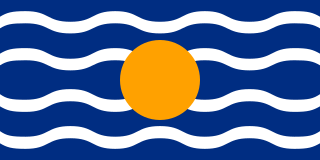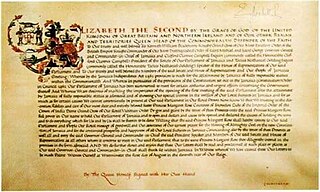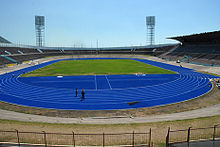
Michael Norman Manley was a Jamaican politician who served as the fourth prime minister of Jamaica from 1972 to 1980 and from 1989 to 1992. Manley championed a democratic socialist program, and has been described as a populist. He remains one of Jamaica's most popular prime ministers.

The People's National Party (PNP) is a social democratic political party in Jamaica, founded in 1938 by Norman Washington Manley who served as party president until his death in 1969. It holds 14 of the 63 seats in the House of Representatives, as 96 of the 227 local government divisions. The party is democratic socialist by constitution.

"Land of the Free" is the national anthem of Belize. The words were written by Samuel Alfred Haynes in 1929 based upon Haynes poem “Land of the Gods.” The musical arrangement for “Land of the Gods,” was composed with Selwyn Walford Young in 1930. “Land of the Gods” was changed to “Land of the Free” by the George Cadle Price administration, officially adopted as the National Anthem of Belize in 1981.

The West Indies Federation, also known as the West Indies, the Federation of the West Indies or the West Indian Federation, was a short-lived political union that existed from 3 January 1958 to 31 May 1962. Various islands in the Caribbean that were part of the British Empire, including Trinidad and Tobago, Barbados, Jamaica, and those on the Leeward and Windward Islands, came together to form the Federation, with its capital in Port of Spain, Trinidad and Tobago. The expressed intention of the Federation was to create a political unit that would become independent from Britain as a single state – possibly similar to Canada, the Federation of Australia, or the Federation of Rhodesia and Nyasaland. Before that could happen, the Federation collapsed due to internal political conflicts over how it would be governed or function viably. The formation of a West Indian Federation was encouraged by the United Kingdom, but also requested by pan-Caribbean nationalists.

"Rise, O Voices of Rhodesia" was the national anthem of Rhodesia and Zimbabwe Rhodesia between 1974 and 1979. The tune was that of "Ode to Joy", the Fourth Movement from Ludwig van Beethoven's Ninth Symphony, which had been adopted as the official European continental anthem by the Council of Europe in 1972. The music used in Rhodesia was an original sixteen-bar arrangement by Captain Ken MacDonald, the bandmaster of the Rhodesian African Rifles. A national competition was organised by the government to find an appropriate set of lyrics to match the chosen tune, and won by Mary Bloom of Gwelo.

Sir William Alexander Clarke Bustamante was a Jamaican politician and labour leader, who, in 1962, became the first prime minister of Jamaica.
"Forged from the Love of Liberty" is the national anthem of the Trinidad and Tobago. Originally composed as the national anthem for the short-lived West Indies Federation (1958–1962), this song was edited and adopted by Trinidad and Tobago when it became independent in 1962. It was written and composed by Patrick Castagne.

The Jamaica Labour Party is one of the two major political parties in Jamaica, the other being the People's National Party (PNP). While its name might suggest that it is a social democratic party, the JLP is actually a conservative party.

Edward Philip George Seaga was a Jamaican politician and record producer. He was the fifth Prime Minister of Jamaica, from 1980 to 1989, and the leader of the Jamaica Labour Party from 1974 to 2005. He served as leader of the opposition from 1974 to 1980, and again from 1989 until January 2005.

Independence Park is a sports and cultural complex in Kingston, Jamaica built for the 1966 British Empire and Commonwealth Games. It houses a variety of sports facilities. A statue of Bob Marley marks the entrance to the site. The main sports venue at the complex is the National Stadium.

The monarchy of Jamaica is a system of government in which a hereditary monarch is the sovereign and head of state of Jamaica. The current Jamaican monarch and head of state, since 8 September 2022, is King Charles III. As sovereign, he is the personal embodiment of the Jamaican Crown. Although the person of the sovereign is equally shared with 14 other independent countries within the Commonwealth of Nations, each country's monarchy is separate and legally distinct. As a result, the current monarch is officially titled King of Jamaica and, in this capacity, he and other members of the royal family undertake public and private functions domestically and abroad as representatives of the Jamaican state. However, the monarch is the only member of the royal family with any constitutional role.
Allan George Richard Byfield was a Jamaican school teacher and politician. He was a senator of the West Indies Federation from 1958 to 1962, and president of the Senate of Jamaica from 1972 to 1980. In the late 1970s he was minister of education.

The Grenada National State Anthem was the national anthem of Grenada from 1967 until independence in 1974 during the period that Grenada was an associated state of Great Britain under the West Indies Act 1967. The words are by Rolstan Percival Jawahir Adams (1946–2008) and the music is by Dr. John George Fletcher (1931–2015).
"In Plenty and In Time of Need" is the national anthem of the country of Barbados. It was written by Irving Burgie and was composed by C. Van Roland Edwards. As one part of the West Indies Federation from 1958 to 1962, Barbados' anthem was supposed to be "Forged from the Love of Liberty", however the current anthem was created with Barbados's moves toward full independence. The song was then adopted by Barbados when it became independent in 1966.

The Colony of Jamaica gained independence from the United Kingdom on 6 August 1962. In Jamaica, this date is celebrated as Independence Day, a national holiday.

Noel Newton "Crab" Nethersole was a Jamaican Rhodes Scholar, cricketer and administrator, lawyer, politician, economist, and Jamaica's Minister of Finance from 1955 to 1959.

Norman Washington Manley was a Jamaican statesman who served as the first and only Premier of Jamaica. A Rhodes Scholar, Manley became one of Jamaica's leading lawyers in the 1920s. Manley was an advocate of universal suffrage, which was granted by the British colonial government to the colony in 1944.

The Independence Day of Jamaica is a national holiday celebrated in Jamaica. This holiday commemorates such an event, it is one of the most senior public holidays celebrated in Jamaica.

Mark Anthony Graham Brantley is the Premier of Nevis, Leader of the Opposition in the National Assembly and former Minister of Foreign Affairs for St Kitts and Nevis. On May 10, 2022, Dr Timothy Harris, having lost the support of the elected majority to function as Prime Minister and facing a historic Motion of No Confidence in the National Parliament, decided to dissolve the Parliament and purported to revoke the appointment of more than 50% of his former Cabinet, including Brantley. Brantley previously served as the leader of the opposition in the National Assembly of Saint Kitts and Nevis . He is married and has 2 daughters. Brantley studied law at the University of the West Indies, obtained his Legal Education Certificate of Merit from Norman Manley Law School in Jamaica and also holds a Bachelor of Civil Law from the University of Oxford, St. Catherine College. Prior to entering politics, Brantley worked as an attorney.
Royal tours of Jamaica by Jamaica's royal family have been taking place since the 20th century. Elizabeth II, Queen of Jamaica, visited the island six times; in 1953, 1966, 1975, 1983, 1994, and 2002.


















